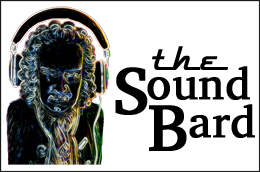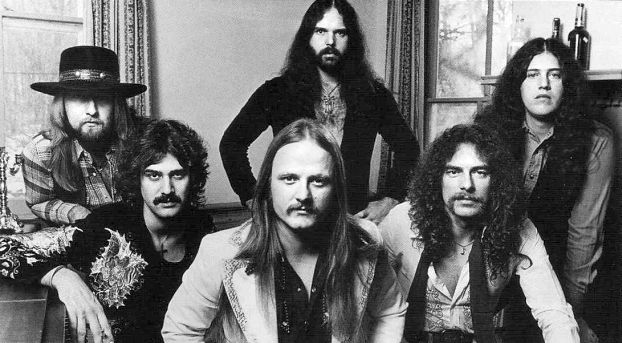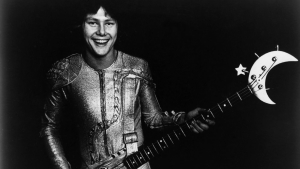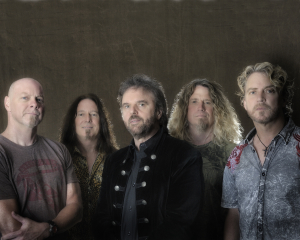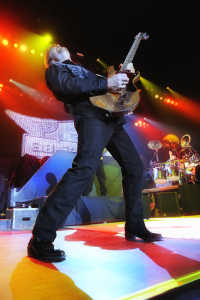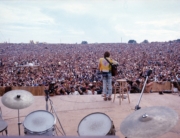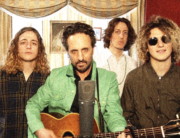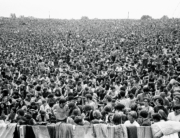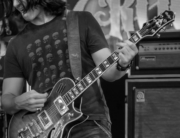BY MIKE METTLER — MAY 19, 2016
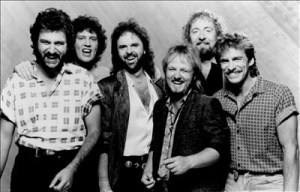
Special Forces: Vintage 38 Special, ’80s style. Don Barnes is third from left, and Donnie Van Zant is directly next to him, fourth from left.
Rock is rock, no matter where it comes from and who’s playing it. Sure, certain sounds and styles will always get some kind of genre label attached to them, but it all really boils down to one thing: Does the music move you? “Obviously, we’re from the South and proud to be Southerners — but you know, man, we just write and play music,” observes Donnie Van Zant, co-founding 38 Special guitarist. Adds co-founding 38 Special vocalist/guitarist Don Barnes, “We derive everything from our influences from before and we’ve kept the standards high, just like they all have.”
More than that, 38 Special fused those influences with their own original pop-meets-rock-at-the-crossroads sensibilities to forge an indelible string of hits including “Hold on Loosely,” “Fantasy Girl,” “Caught Up in You,” and “If I’d Been the One,” to name but a few. And the band’s legacy continues to roll ever onward, with Barnes currently on the road this summer fronting 38 Special while Van Zant, essentially retired from both the band and the live stage, is all excited about the imminent July 1 release of a live album from Van Zant (the band he formed with his brother Johnny Van Zant) called Red White & Blue (Live) (Loud & Proud Records).
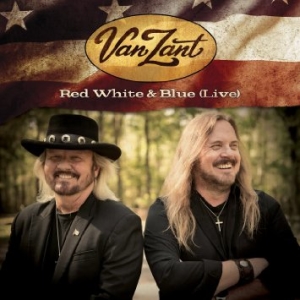 RW&B(L) was recorded on January 28, 2006 at Wild Adventures Theme Park in Valdosta, Georgia by onetime 38 bassist Larry Junstrom (a.k.a. “LJ”) with his own mobile recording equipment. Besides Van Zant country-chart hits and a few Lynyrd Skynyrd staples, the album also features Johnny taking a crack at the title track to 38’s hit 1981 album, Wild-Eyed Southern Boys. “It’s just about the first time I ever sang it!” Johnny told me recently. “And that’s a cool thing. I got a lot of enjoyment out of doing that.” And even in semi-retirement, Donnie Van Zant says he’s still got the fire: “Well, I gotta be true with you, sir — I only know one volume, and that’s 10.”
RW&B(L) was recorded on January 28, 2006 at Wild Adventures Theme Park in Valdosta, Georgia by onetime 38 bassist Larry Junstrom (a.k.a. “LJ”) with his own mobile recording equipment. Besides Van Zant country-chart hits and a few Lynyrd Skynyrd staples, the album also features Johnny taking a crack at the title track to 38’s hit 1981 album, Wild-Eyed Southern Boys. “It’s just about the first time I ever sang it!” Johnny told me recently. “And that’s a cool thing. I got a lot of enjoyment out of doing that.” And even in semi-retirement, Donnie Van Zant says he’s still got the fire: “Well, I gotta be true with you, sir — I only know one volume, and that’s 10.”
Recently, I got on the line separately with Van Zant, 63, and Barnes, also 63, to discuss the rich musical history of 38 Special and their hometown of Jacksonville, Florida, working with Dan Hartman as their early-era producer, and their respective legacies as both songwriters and performers. They’re just two wild-eyed Southern boys caught up in making some good ol’ rock & roll for anyone who’s willing to listen.
Mike Mettler: Donnie, would you agree the phrase “The first family of Southern Rock” applies to you and your brothers Ronnie [the late lead singer and chief songwriter of Lynyrd Skynyrd] and Johnny [current Lynyrd Skynyrd lead singer and Donnie’s partner in Van Zant]?
Donnie Van Zant: You know what? I’ll let other people reply to that. We try to do the very best we can.
Mettler: Well, so far, so good, I think. A lot of that is in your DNA, literally, as you had a strong parental unit with your mom and you dad behind you while you were growing up. You had respect for your family, and I think that goes a long way in coming out in what you guys do musically.
Van Zant: Oh, big time, brother; big time. We had parents who were totally supportive of anything we wanted to do. They didn’t care what exactly we did — whether we drove a truck, painted houses, or worked at a grocery store — as long as we did the very best we could do. That was what was important to them — always put in the effort, and try to be the best that you can be at whatever. They instilled that in all of us, and in my sisters too.
The truth of the matter is, we grew up on country. My dad was a long-distance truck driver and my mom was a manager of a Dunkin’ Donuts shop. Back then, if your dad drove a truck, that’s what you listened to — country. Mel Tillis, Hank Williams, Faron Young, and George Jones were the people we listened to. We were very influenced by all of that. Johnny Cash was a real big one too. We just loved that rebel feel from him! (laughs heartily)
Mettler: Jacksonville seems like it was such a hotbed for music when you were growing up there in the ’50s and ’60s.
Van Zant: It sure seemed like it. That’s what I’ve always said — there was some good water here, that’s for sure! (laughs) It’s really wild. It was blue collar, working class people. Where we grew up, on the west side of Jacksonville, was a pretty rough side of town. Most of my buddies I grew up with either ended up dead or in prison. Thank God we got into music, and moved away.
Mettler: “Dead Or in Prison” — I think that’s a song for your next album. (Van Zant laughs) So you could just ride your bike down the street, and you’d be at one of the Skynyrd boys’ houses, just a couple blocks down?
Van Zant: That’s correct. And with 38, you’re talking about three members of the group who actually lived on the same street, Woodcrest Road. Well, there was actually a line dividing us from where Don Barnes lived, and that was called Lake Shore Boulevard. And as Don would tell you, you don’t cross Lake Shore Boulevard and go to the Van Zant side, because it was very dangerous! He was on the same side! (chuckles)
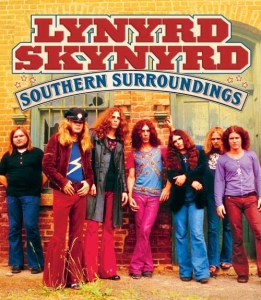 Don Barnes: That’s right. I used to ride my bike to Allen [Collins, co-founding Lynyrd Skynyrd guitarist]’s house. He had all those great guitar licks, and we’d listen to old British import records.
Don Barnes: That’s right. I used to ride my bike to Allen [Collins, co-founding Lynyrd Skynyrd guitarist]’s house. He had all those great guitar licks, and we’d listen to old British import records.
Jacksonville was a navy town, so all those guys from Duane Allman to Gregg Allman to Ronnie Van Zant and all those other bands — Molly Hatchet, The Outlaws, and the guys in Blackfoot, all living right down the road — we all played sailor’s clubs at 15 years old. When you can make 100 bucks a week at age 15, that’s big money.
We learned all the structures of those songs in the early days as kids, because you had to learn the hits of the day from the radio, and you found what the actual craft of building a song was. There’s an A section, and a little ramp that goes to the chorus, a bridge, and an outro — all those things. You find what’s the big payoff on those things. Of course, then you get cocky and you go, “Well, I’m going to write my own songs.” And then you starve for 10 years. (laughs)
Mettler: That’s called paying your dues.
Barnes: I don’t highly recommend it! You gotta sacrifice so much. If you have some stability to fall back on, you should probably do that. There are no guarantees. You have hopes for some songs where you think, “Oh, this is going to go all the way.” And it doesn’t do it. But one that you might have a lot of hope about actually does click.
Mettler: If Skynyrd was considered one of the backbones of ’70s rock radio, then 38 Special was one of the backbones of ’80s rock radio.
Barnes: We’re fortunate to have had 15-16 hit songs throughout the years, a couple #1s, Top 10s, Top 20, Top 40, whatever — people relate to those songs. You know how that whole thing goes. People go, “Man, I remember what I was doing when that song came out.”
Mettler: I think one of the reasons you got a lot of airplay had to do with the ways you were able to blend melody and harmony, which definitely reminds me of a certain Fab Four across the Pond. Those touches appear in your own songwriting.
Barnes: Yeah, we were big fans of them. Coming from the South, it’s automatically assumed you’re going to sing bluesy stuff about bad whiskey and women. We also learned a lot from Ronnie Van Zant, from the early Skynyrd days.
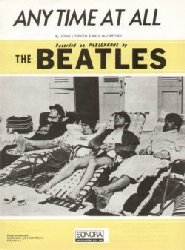 Mettler: Is there any one Beatles song that still stands out to you today, as a songwriter?
Mettler: Is there any one Beatles song that still stands out to you today, as a songwriter?
Barnes: Well, I always liked the more “power” stuff when they came out. They got a little eclectic, artistic — Paul McCartney, with his dad’s influences, and the skiffle stuff. I liked the early days — just real powerful (sings), “Any time at aaa-alll!” [from 1964’s A Hard Day’s Night]. So we fashioned our sound after that.
We had done an early album that was basically rehashed Southern rock, but it had already been done by the best — The Allmans, Skynyrd, and everything. But Ronnie Van Zant, he said, “Don’t be a clone of someone else. Don’t copy what’s in front of you. Take on your own influences and be true to what you like. And if you like more of a pop element, then try to explore that.” And that was some good advice. We had gone down the road with a couple of albums that had been panned, which were kind of the same thing.
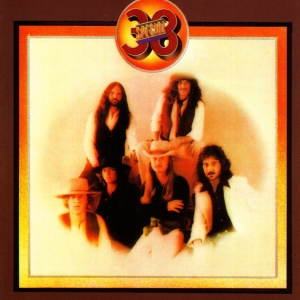 Mettler: Well, I’m still partial to your 1977 debut album [38 Special] that has songs like “Long Time Gone” and “Fly Away” on it.
Mettler: Well, I’m still partial to your 1977 debut album [38 Special] that has songs like “Long Time Gone” and “Fly Away” on it.
Barnes: Ohh! Well, that’s great! (chuckles) You remember that long ago!
Van Zant: Uh huh! Oh man, thank you so much! I don’t hear that very often.
Mettler: That album and 1978’s Special Delivery were both produced by Dan Hartman. I think people don’t realize he was a pretty good producer back in the day, not just the guy who wrote and sang “I Can Dream About You.” [Hartman’s 1984 solo hit “I Can Dream About You,” from the Streets of Fire soundtrack and later the album of the same name, reached on #6 on the Billboard Hot 100 singles chart.]
Barnes: Yeah! We didn’t have many people coming and recording us back then because we were young and green, so they said, “Well, this guy Dan Hartman — he wrote ‘Free Ride’ [for The Edgar Winter Group, in 1973] and sang it, and has his own studio in his house.”
Van Zant: Oh my God, yeah. What a talented guy he was. I learned so much from him. I mean, I didn’t believe how much I didn’t know. Being around Dan, you just ate it all up, that’s for sure. Unbelievable musician, and just a great teacher. He taught me so many different things.
We went up there to Connecticut for those first two records 38 ever made, and we were just getting started. We were very green, and he helped us out, all of us.
Barnes: We had a great experience with him. He had his own studio in Connecticut called The School House. A big room was built onto the original school house, and he made a studio where you could put an amp in the bathtub and run an out right from there, because the whole house was wired. You could get all these great sounds from hard surfaces and acoustic tiles.
We had a great time. We lived in his house, and he was a good guy. It was a sad ending for him, but we did a couple of good albums together. [Hartman passed away at the age of 43 on March 22, 1994, of an AIDS-related brain tumor.]
This guy was so multi-talented. We would wake up and come down to the den and hear somebody playing like Hendrix, with the amp low-tuned. He could play like Hendrix. And then he’d sit down at the piano and play all these Elton John songs. He loved the Philadelphia Soul — that’s why you can hear it in “I Can Dream About You.” He loved The Spinners, and all those guys. He was like a sponge; he soaked up all those influences. And it was amazing to see the guy be such a virtuoso at every instrument — singing, playing, producing, piano, guitar. And he played bass in Edgar Winter.
Mettler: He could do it all.
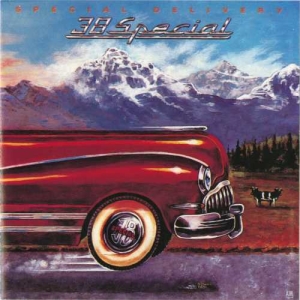 Barnes: We have some good memories about that. We went to Edgar’s house — he lived in Westport also — for him to put a sax solo on one of the early songs [“Can’t Keep a Good Man Down,” on Special Delivery]. Edgar just floored everybody with the first take. We thought it was great and we were getting ready to leave, but he’s such a perfectionist, so he went, “Well, let me try it again,” and he’d do nine or ten passes at it again. We kept the first one, because it was so spontaneous. But he is truly a genius, Edgar is.
Barnes: We have some good memories about that. We went to Edgar’s house — he lived in Westport also — for him to put a sax solo on one of the early songs [“Can’t Keep a Good Man Down,” on Special Delivery]. Edgar just floored everybody with the first take. We thought it was great and we were getting ready to leave, but he’s such a perfectionist, so he went, “Well, let me try it again,” and he’d do nine or ten passes at it again. We kept the first one, because it was so spontaneous. But he is truly a genius, Edgar is.
Van Zant: Somebody asked me what was my favorite record of ours — I don’t actually have favorites. Any song that got onto a 38 or Van Zant record, I had to feel they were “A” songs, or they wouldn’t have made it anyway.
Mettler: That’s what I liked about the records you guys made back in the day. Each album was 40-ish minutes, and every song was worth being on there.
Van Zant: That’s right. The way I looked at it, you wanted to give the people their money’s worth. I remember buying records where there’d only be one good song.
Mettler: And then you felt like you got ripped off.
Van Zant: You did! You felt like you got ripped off. You bought the whole record for one song. We thought just the opposite of that. We’d write 50 songs to get 10.
Mettler: That’s the mark of being good editors, something I think got lost in the CD age. We all love the convenience of CD and digital, but having a good solid 15-20 minute side that you can put the needle down on and then flip it over was where it was at for me.
Van Zant: You know, it’s weird you say that, because I just did that the other day. I actually went out and bought a record player again. I have a collection of records I’ve kept over the years, and it was cool to hear that sound. For one thing, it was a little dirtier of a sound. It wasn’t so clean, like digital.
Mettler: There’s just something about analog that’s better represented by a needle on a groove.
Van Zant: That’s correct!
Mettler: What was the first record that had impact on you growing up?
Van Zant: From other artists? I was a big Eric Clapton fan — I love Derek and the Dominos. My favorite song is “Layla.”
Mettler: Can’t go wrong with that. I love the piano coda Bobby Whitlock added at the end of it.
Van Zant: Oh sure, and Eric is such a great singer too. I loved all that. I also love the blues. If it had some heart and soul to it, I loved it. The only type of music I never got into was opera. Couldn’t get into it, but I learned to appreciate it.
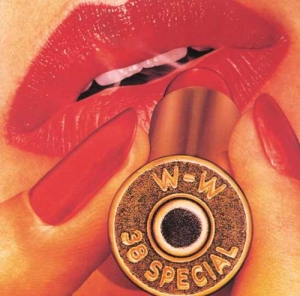 Mettler: What did you put on the turntable you just got?
Mettler: What did you put on the turntable you just got?
Van Zant: You know what — it was actually an old 38 Special record. It was a song called “Stone Cold Believer” [on 1979’s Rockin’ Into the Night]. That, and another song called “You’re the Captain” [on the same album]. I didn’t know if I could remember them, but it was cool to put them on and listen to them.
Mettler: I don’t think I have that one on vinyl, so maybe we can get Universal/A&M to re-release the 38 Special catalog in a 180-gram vinyl box set.
Van Zant: Vinyl’s made a nice comeback, brother. I’d buy that one, right there.
Mettler: Me too — that makes two sales right off the bat. (Van Zant laughs) Don, let’s talk about “Hold on Loosely,” the big hit you wrote with Jim Peterik [of Survivor and “Eye of the Tiger” fame. “Hold on Loosely” reached #27 on the Billboard Hot 100 singles chart and #3 on the Hot Mainstream Rock Tracks chart in 1981.]
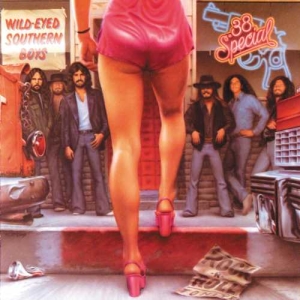 Barnes: “Hold on Loosely” was a good piece of advice for a lot of people in their relationships. We wrote that at Jim’s kitchen table. Before we’d write the songs, we had little pieces of songs and guitar licks. Songwriting is a real insecure thing. You just have little bits of things, and you just need one other person to say, “You know, that’s not bad.”
Barnes: “Hold on Loosely” was a good piece of advice for a lot of people in their relationships. We wrote that at Jim’s kitchen table. Before we’d write the songs, we had little pieces of songs and guitar licks. Songwriting is a real insecure thing. You just have little bits of things, and you just need one other person to say, “You know, that’s not bad.”
I was going through a bad time in a bad marriage back then, and I said, “What is it about people trying to change each other — not celebrating their differences, not giving each other room to breathe?” So I said to Jim, “What do you think about this title?” I had it in my notebook. It said, “Hold on Loosely.” He said, “Oh yeah — but don’t let go.” That was the perfect couplet, and then we were off to the races. It said everything in that little quote there that people needed to take heed from.
I always joke that we wrote it at his kitchen table, but he didn’t eat it with a fork. (both laugh)
Mettler: That kitchen table should be in the Rock & Roll Hall of Fame.
Barnes: I’m telling you — the old boombox, everything from those days, the old cassette players. We’d take the guitar, lean down into the boombox, and sing into that and make a little scratch tape of it. By the time we got to the studio, I was still pulling out the little boombox scratch tapes.
I love the little happy accidents that happen at the moment where you go, “I’m gonna try to recreate that change there.” It’s interesting how things do grow from a little seed like that.
Mettler: Sure is. I’ve seen a cross-section of generations in the 38 Special audience in the last few years, especially recently. You’ve got plenty of younger faces out there looking back at you.
Van Zant: Even 3 or 4 years ago, the audience that came to out shows was very broad; that’s all I can tell you. People our age and older, we had teenagers, and that music crossed over to a lot of different age brackets. Again, it’s because they were live, real songs, and people related to that. It’s the reason Lynyrd Skynyrd got so big. My brother Ronnie wrote songs about truth — songs about what he lived and what he saw other people go through. As long as you live by that and write about that, people can see it.
Barnes: We recently got nominated into the Georgia Music Hall of Fame [in 2012], which is real nice. I saw Rodney Mills [producer of 38 albums like Wild-Eyed Southern Boys and Special Forces] there, and I hadn’t seen him in 25 years. He gave a little speech and said, “Can you believe those little songs we cobbled together all those years ago are still played all across the country every day?”
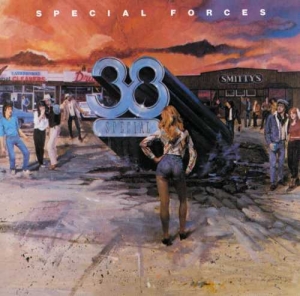 You’ll see on Twitter where these radio stations will Tweet out, “Coming up this hour: The Rolling Stones, Aerosmith, and 38 Special.” We’re so thankful. We had no idea — we were just trying to survive. Maybe the kids are picking up on the desperation in a lot of those songs. (chuckles)
You’ll see on Twitter where these radio stations will Tweet out, “Coming up this hour: The Rolling Stones, Aerosmith, and 38 Special.” We’re so thankful. We had no idea — we were just trying to survive. Maybe the kids are picking up on the desperation in a lot of those songs. (chuckles)
One thing I told my wife Christine was when Rockin’ Into the Night came out in 1979, we had really been sucking wind. We were down and out. We had done two albums before that. This was our third album, and it was going to be over for us. But we just couldn’t bear going back as a failure, you know? So I can hear me over-singing everything: “ROCKING into the night!” The desperation is shining through, and I can still hear that hunger, because we gotta have this, you know? A&M were already kind of turning away from us and moving onto something else, and we were like, “Wait wait wait — we have more to offer!!”
On Special Forces (1981), we were still trying to cobble something together, to create a history for ourselves. It was a brotherhood. We were neighborhood guys — meat-and-potato guys hammering it out and trying to make it all work.
Mettler: To me, a Special Forces song like “Chain Lightnin’” is the definitive statement for you guys, and probably my favorite track of yours overall.
Barnes: That’s my favorite one to play live — it has all the production with the smoke, the lightning flashes, and the thunder; all that stuff. Jim [Peterik] and I wrote that together. We took a bit of a story — there’s truth in those songs, taken from real life. We fashioned it after Harry Chapin: “riding along in my taxi” [a line from “Taxi,” Chapin’s 1972 hit single that reached #24 on the Billboard Hot 100 singles chart]. It’s a bit like that — riding along many years later, the woman in a fur coat, and you remember how you’d been together years before, and could it be happening again? Chain Lightnin’. That kind of stuff. It was fashioned after that.
We save that one for the encore. We hit the audience with all those hits. We put a medley together of secondary songs from movies, like “Teacher, Teacher” [from 1984’s Teachers]. We want to make sure people hear their favorite songs, whether it be “Back to Paradise” from Revenge of the Nerds II (1987). I tell people, “Kind of a sucky movie, but a great song.” (laughs heartily)
Mettler: I saw that movie in the theater, and I’m not ashamed to admit that, either. And it was cool to hear that song in the movie, because it wasn’t on one of 38’s albums at the time.
Barnes: You’ll hear another one of ours in Spring Break [1983; “You Keep Runnin’ Away”] and Without a Paddle [2004; “Hold on Loosely”], all these other ones.
So we put the medley together like that, and it’s nonstop hit after hit — line ’em up and shoot ’em down. And people are just amazed, because we get those comments: “I didn’t realize it was you guys who did ‘Rockin’ Into the Night’!” Yeah, we were that desperate in 1979!
We hit ’em with all that stuff and say, “Thanks for listening, thanks for taking the ride!” They’re cheering, and then we walk off. And while they’re cheering, here comes the thunder, the lightning, and the smoke all blend together, and then we walk back out and do “Chain Lightnin’.”
Mettler: Donnie, I know you don’t perform live with the band anymore, but I remember watching you onstage a lot of times, and you just couldn’t stand still in one place for too long. You went everywhere up there! What’s up with that? That’s kind of your signature.
Van Zant: You know what? I just felt it. That’s it. I never knew what I was gonna do. And most of the guys in 38, they all had to watch themselves, because they were scared they mighta gotten hit in the head with a microphone stand. (chuckles)
I love an energetic show, and I think you’re there to entertain people. I can remember going to shows myself as a teenager thinking, “God, this is such a boring show.” It’s like we talked about earlier — it’s all about the placement of songs, and making it entertaining and exciting.
Barnes: We come from that Skynyrd school of going out there like a football team — being triumphant, and winning the night. Most people go out there to party and have fun — we do that too, but at the same time, it’s all serious work getting the job done.
Mettler: There’s something to be said in this day and age for a band going out there and actually singing and playing real instruments on real songs that they wrote themselves.
Barnes: Kevin Cronin [of REO Speedwagon], we talked about that, the last time we got together. People come up and say, “I can’t believe you guys actually sing these songs, and you play your own instruments!” Well, that’s what you’re supposed to do! (chuckles)
That’s what we started out doing. It becomes a bit of an anomaly after so many years. You hear people track with sequencers and all that, so when real guys come out, the people come out, and they appreciate that.
It’s funny — all those years ago, we were always in direct competition with bands like REO Speedwagon and Styx; everybody was competitive back then. You’re ready to go out there and kick their ass if they’re going to follow you, or whatever. But all these years later, just the fact that we all survived — there’s just this mutual respect, because we’re all there, and a lot of people didn’t survive. Everybody’s happy to be there, and make a good time for the audience. We look at it like a three-ring circus, and every ring has got its great attraction.
We’re bringing all of the history and all of the hits, the catalog, and the career. And unfolding that history brings a lot of people joy and a lot of happiness.
Tags: 38 Special, A&M, Allen Collins, Any Time at All, Blackfoot, CD, Chain Lightnin', Dan Hartman, Derek and the Dominos, Don Barnes, Donnie Van Zant, Duane Allman, Edgar Winter, Edgar Winter Group, Eric Clapton, Fantasy Girl, Florida, Free Ride, Georgia Music Hall of Fame, Gregg Allman, Hold on Loosely, I Can Dream About You, If I'd Been the One, Jacksonville, Jim Peterik, Johnny Van Zant, Kevin Cronin, Larry Junstrom, Layla, LJ, Loud & Proud Records, LP, Lymyrd Skynyrd, Molly Hatchet, Paul McCartney, Red White & Blue Live, REO Speedwagon, Rockin Into te Night, Rodney Mills, Ronnie Van Zant, Southern rock, Special Delivery, Special Forces, Styx, Teacher Teacher, The Allman Brothers Band, The Beatles, The Outlaws, turntable, Universal, Van Zant, Wild-Eyed Southern Boys
